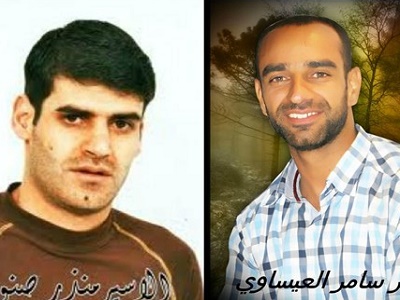
Two Palestinian prisoners ended their hunger strikes on Sunday after spending 11 days without food, according to the Palestinian Committee of Prisoners’ Affairs.
Director of the committee Issa Qaraqe reported that prisoners, Samer al-Issawi, a resident of occupied East Jerusalem, and Munther Snawbar, a Nablus native, who are being held in Israel’s Nafha prison, ended their hunger strike after Israeli Prisons Service (IPS) officials agreed to transfer all female Palestinian prisoners from Damon prison to Hasharon prison, which is located closer to the Israeli courts in which the detainees are tried.
The agreement will save the female Palestinian prisoners from “the hours of suffering they used to go through while being taken to Israeli courts for trial from the far away Damon prison,” Qaraqe said.
A protest in #Gaza city in solidarity with the #Palestinian hunger striker prisoners Samer Issawi & Monther Sanawbar in the #Israeli jails. pic.twitter.com/1V7DNUSG38
— Days of Palestine (@DaysofPalestine) November 3, 2016
The agreement also stipulated that when female Palestinian prisoners are taken to Israeli courts for trial, they must be taken directly to the courts, without stopping at Ramla prison on the way, something that IPS officials had subjected female prisoners to previously.
Qaraqe added that IPS also “promised” to reconsider the security ban on families visiting their sons in Israeli jails.
Al-Issawi and Snawbar began their solidarity hunger strikes last month in protest of the treatment of the female Palestinian prisoners being held in the Damon detention center.
SAMER AL-ISSAWI DECLARES HUNGER-STRIKE TO SUPPORT FEMALE POLITICAL PRISONERS IN DAMON PRISON https://t.co/wv1Gvd2mI9 #FreePalestine #Israel
— @IAmTheAntidote (@IPNOTGlobal) October 28, 2016
Their initial demands included the transfer of the prisoners to a detention facility closer to the courts in which the detainees are tried, that the prisoners be provided with appropriate medical treatment, and that international NGO Doctors Without Borders (MSF) be allowed to visit the prisoners.
Al-Issawi gained global recognition in 2012 when he began a hunger strike to protest being redetained by Israel after he was freed as part of the 2011 Gilad Shalit deal.
Upon signing a deal guaranteeing his release, the East Jerusalem native ended his strike in April 2013 after 266 days without food.
Al-Issawi was released in December 2013, only to be detained once again six months later.
(MA’AN, PC)




